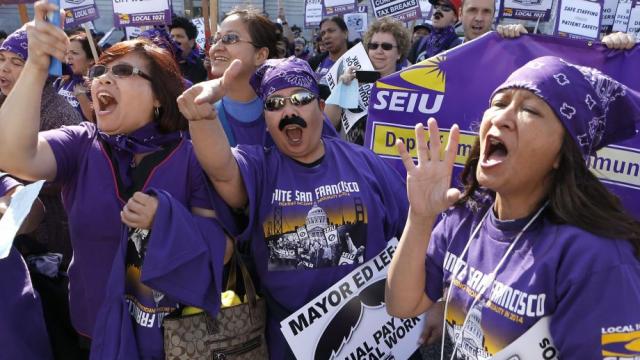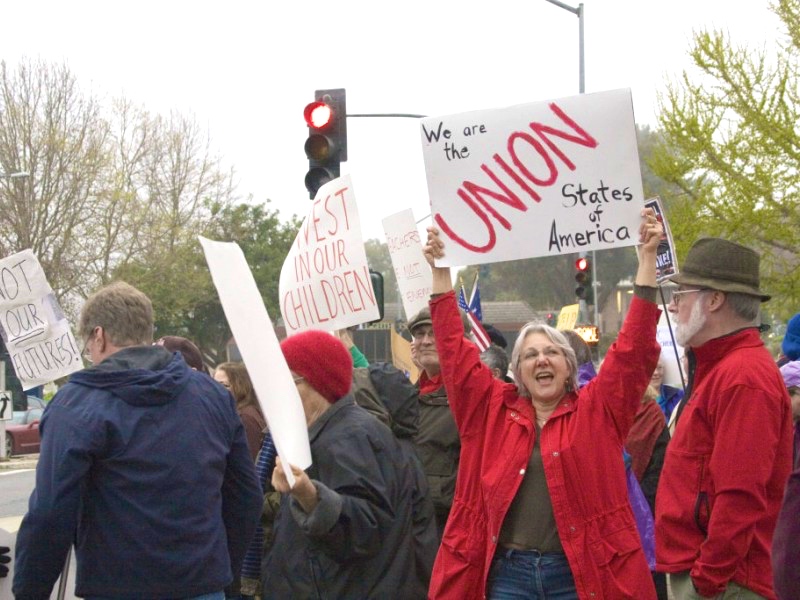
The popular “No Justice, No Peace” refrain was belted out across San Francisco’s Financial District last Tuesday and Wednesday as men and women in business attire skirted by, heading to their jobs in a city that has become the epicenter of America’s rising debate on inequality.
The chant, popularized across the country over the past eight months in the #BlackLivesMatter call to end police violence and racism, was instead being deployed by scores of workers showing solidarity at two of the city’s top hotel chains, Le Meridien and the Hyatt Fisherman’s Wharf.
Organized by Unite Here Local 2, unionized hotel workers from across San Francisco held placards demanding the Chesapeake Lodging Trust, which owns Le Meridien and Hyatt Fisherman’s Wharf, give workers the opportunity to choose whether or not they want to unionize.
“We are here to show solidarity with these workers and fight for their right to choose to unionize or not,” Local 2 organizer Richard Kuan told Occupy.com last Wednesday, as dozens of workers stood by colleagues demanding the right to form a union.
Kuan said the battle has been ongoing for years but that for two days straight last week, from 7pm to 7am, unionized hotel workers from across the city came together in a fresh attempt to push Meridien and Hyatt ownership in allowing workers to decide their own future without retaliation or termination.
“We want them to have the chance to choose without [company] retaliation against the workers,” Kuan added.
According to a pamphlet being handed to passersby, workers at the two locations have been in “a serious labor dispute for over six years” with hotel management at the chains. They urged guests to think about their chosen place of stay while in San Francisco, and listed a series of employee grievances:
“Workers at these properties have experienced: loss of hours; loss of restroom, lunch and rest breaks due to increased workloads; employer rules that attempted to limit employee rights (Hyatt Fisherman’s Wharf); management threats and intimidation (Le Meridien); lack of transparency regarding how renovations will affect their employment of work schedule,” read the pamphlet.
Under California Labor Law, non-exempt employees are entitled to 10-minute breaks every four hours and, if working in excess of six hours in one day, minimum 30-minute lunch breaks. Employees who don't receive a rest break are entitled to one hour of pay for every day the break was skipped. On top of that, workers who voice concerns or demand their breaks and lunch periods cannot be intimidated or threatened with termination.
Kuan and the workers present last week, however, said management at both hotels refused to acquiesce to their demands and had brushed off concerns of the workers. Efforts to bring workers together to form a union have been met with threats of termination. The result was a call for a boycott – but guests at the upscale hotels have so far largely ignored the workers' call or the conditions forced upon them.
“Crossing picket lines and spending money at a hotel under boycott is not cute,” says Unite Here. “It is a blatant sign of disrespect for the hotel workers campaigning for equality and respect.”
San Francisco is a divided city to say the least. A study from the city’s Human Services Agency shows inequality in the city is on par with Rwanda. But even as middle class and poorer segments of the city continue to fall further behind amid a tech boom that has sent rent prices soaring, residents remain adamant that their city upholds the progressive values of decades past.
“I don’t know why they are upset,” said one passerby who refused to give his name. “We pay among the highest minimum wage in the country and people should be able to survive. If they don’t like the job, then find something else.”
But like the broader debate over inequality, protests for greater workers’ rights – and specifically, the battle for hotel employees to form a union – isn't likely to be solved in the near future.
3 WAYS TO SHOW YOUR SUPPORT
- Log in to post comments












